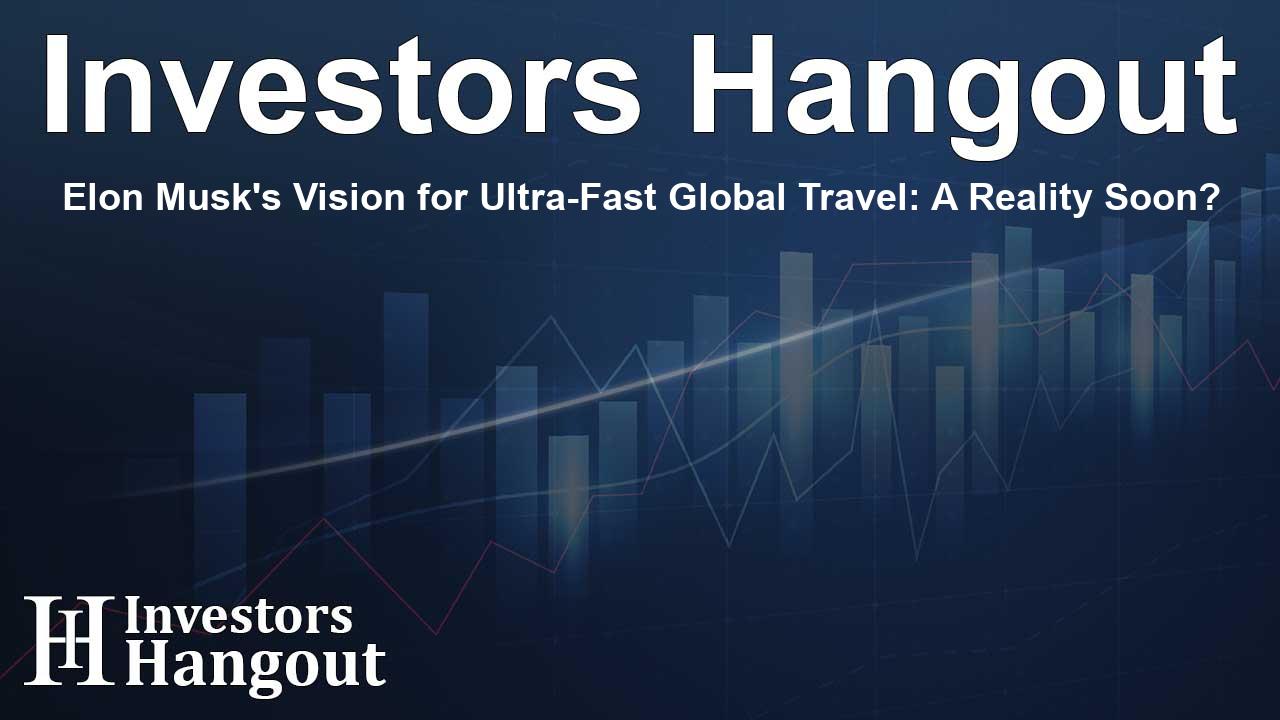Elon Musk's Vision for Ultra-Fast Global Travel: A Reality Soon?

Introduction to Elon Musk's Travel Revolution
Elon Musk has always been a pioneer, consistently pushing the boundaries of technology. A few years back, he proposed revolutionary earthbound rocket flights that could transport people around the globe in under thirty minutes. Fast forward to the present, Musk declares we're closer than ever to this ambitious reality.
The Vision of Intercontinental Travel
Musk envisions a future where traveling between continents could reach dizzying speeds of up to 16,700 miles per hour utilizing SpaceX’s Starship rockets. Designed for deep space missions to the Moon and Mars, these rockets could significantly cut travel time. For instance, a journey from New York City to Shanghai could happen in just 39 minutes, while a trip to London might take a mere 30 minutes.
Passenger Experience: An Intense Adventure
While the notion of such rapid travel is exhilarating, it does come with its challenges. Passengers can expect a much more intense experience than traditional flying. The journey would involve significant G-forces during launch and landing, and travelers would need to remain secured throughout their flight due to low gravity. Unfortunately, the nature of rocket travel means there will likely be no onboard comforts like snacks or restroom breaks.
The Cost of Speed: Can Everyone Afford It?
A pressing question arises regarding the affordability of these rapid flights. Musk has previously suggested that the prices may someday rival that of standard economy plane tickets. However, as experts point out, the current cost for a brief trip to space is exceedingly high. Companies like Virgin Galactic offer experiences that approach half a million dollars per person – a steep price by any standard.
Future Market Potential for Space Travel
In a 2019 report, UBS projected that the market for high-speed point-to-point space travel could potentially grow to $20 billion annually by 2030, contingent on technology advancements. Although Musk is optimistic about securing point-to-point travel in the coming years, he has remained vague about initial pricing details.
Challenges in Implementing Space Travel
Transitioning rockets for long-distance flights introduce numerous safety and regulatory challenges. Rockets face stricter regulations compared to airplanes, demanding approval from agencies such as the Federal Aviation Administration (FAA). Musk's belief that approval could be fast-tracked has sparked significant discussion given that the technologies are still under evaluation.
Demand for Long-Distance Travel Options
Despite ongoing hurdles, experts are confident in the demand for such travel. Currently, over 150 million travelers embark on flights exceeding ten hours each year. According to UBS, if just a small fraction – say, 5% – of these travelers opt for rocket flights priced around $2,500 each, the market could thrive.
Expert Opinions: Skepticism Amidst Optimism
While some, like author Sam Dinkin, express doubt about the accessibility of affordable space travel in the near future, others view Musk's pioneering initiatives as once-in-a-lifetime advancements. Dinkin pointed out in 2019 that while the market could support such pricing, the feasibility and timing of achieving this level of affordability remains uncertain.
Conclusion: The Future of Travel
Elon Musk's ambition to offer a 40-minute flight from New York to Shanghai is undeniably intriguing. However, whether this innovative travel method becomes a mainstream option or remains a luxury for the wealthy will hinge on technological advancements and the reduction of operational costs. As we wait for the future, Musk's vision provides a captivating glimpse into what may define the next era of global travel.
Frequently Asked Questions
1. What is Elon Musk's plan for rapid space travel?
Elon Musk aims to use SpaceX's Starship rockets to facilitate incredibly fast global travel, with potential flights between cities taking as little as 30 to 40 minutes.
2. What challenges does space travel pose for passengers?
Passengers will experience intense G-forces during launch and landing, and the rocket's design limits amenities such as snacks and bathroom breaks.
3. Will these flights be affordable for the average traveler?
While Musk suggests pricing could resemble that of an economy plane ticket, experts argue that initial costs might still be prohibitively high.
4. How large is the market for space travel expected to grow?
A UBS report estimates the high-speed point-to-point space travel market could reach $20 billion annually by 2030, depending on technological advancements.
5. Are there regulatory hurdles for space travel?
Yes, rockets are subject to stricter regulations than airplanes, and approvals from agencies like the FAA will be essential for this form of travel to take off.
About Investors Hangout
Investors Hangout is a leading online stock forum for financial discussion and learning, offering a wide range of free tools and resources. It draws in traders of all levels, who exchange market knowledge, investigate trading tactics, and keep an eye on industry developments in real time. Featuring financial articles, stock message boards, quotes, charts, company profiles, and live news updates. Through cooperative learning and a wealth of informational resources, it helps users from novices creating their first portfolios to experts honing their techniques. Join Investors Hangout today: https://investorshangout.com/
Disclaimer: The content of this article is solely for general informational purposes only; it does not represent legal, financial, or investment advice. Investors Hangout does not offer financial advice; the author is not a licensed financial advisor. Consult a qualified advisor before making any financial or investment decisions based on this article. The author's interpretation of publicly available data shapes the opinions presented here; as a result, they should not be taken as advice to purchase, sell, or hold any securities mentioned or any other investments. The author does not guarantee the accuracy, completeness, or timeliness of any material, providing it "as is." Information and market conditions may change; past performance is not indicative of future outcomes. If any of the material offered here is inaccurate, please contact us for corrections.